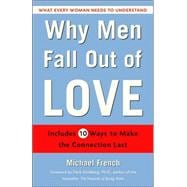
| Foreword | p. vii |
| Acknowledgments | p. xi |
| Introduction: When Men Stop Loving | p. xv |
| The Hidden Lives of Men | p. 3 |
| The Loss of Intimacy | |
| Steven's Story | p. 29 |
| Roddy's Story | p. 57 |
| The Quest for Validation | |
| Bill's Story | p. 91 |
| Tom's Story | p. 111 |
| George's Story | p. 141 |
| The Perfection Impulse | |
| Barry's Story | p. 165 |
| Benjamin's Story | p. 193 |
| Hugh's Story | p. 219 |
| The Fading of Attraction | |
| Andrew's Story | p. 249 |
| Eddie's Story | p. 278 |
| The Thinking Heart: A Rational Look at Love | |
| The Need for a Relationship Audit | p. 311 |
| Hope for Every Couple | p. 319 |
| Bibliography | p. 329 |
| Table of Contents provided by Ingram. All Rights Reserved. |
The New copy of this book will include any supplemental materials advertised. Please check the title of the book to determine if it should include any access cards, study guides, lab manuals, CDs, etc.
The Used, Rental and eBook copies of this book are not guaranteed to include any supplemental materials. Typically, only the book itself is included. This is true even if the title states it includes any access cards, study guides, lab manuals, CDs, etc.
Excerpted from Why Men Fall Out of Love: What Every Woman Needs to Understand by Michael French
All rights reserved by the original copyright owners. Excerpts are provided for display purposes only and may not be reproduced, reprinted or distributed without the written permission of the publisher.